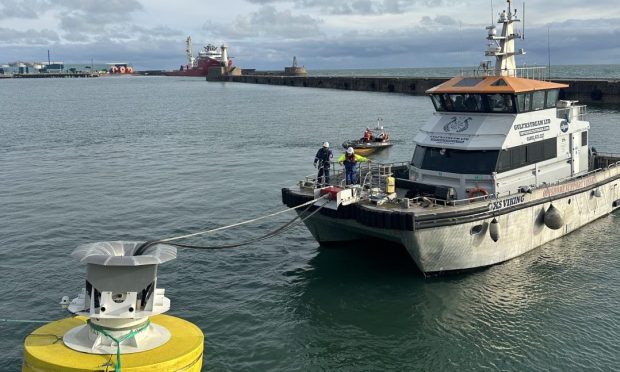North-east green energy technology firm Oasis Marine said today it had successfully transferred power to a vessel using its Oasis Power Buoy (OPB),
The milestone was achieved off Peterhead and is expected to pave the way for hybrid and fully electric vessels on offshore wind farms.
According to Deeside-based Oasis Marine, the technology can also help to reduce maritime carbon emissions by expanding vessel charging beyond ports and harbours.
Storm Babet failed to stop Oasis
The OPB system comprises a mooring buoy and electrical power connection.
During a series of tests off Peterhead, energy was transferred via the technology to a load bank on the GXS Viking crew transfer vessel. Testing took place either side of Storm Babet so getting successful results was no small feat, given the terrible weather.
Oasis Marine managing director George Smith said: “Innovative developments are being made with the design and production of electrified vessels, but range will always be constrained by battery capabilities.
This ensures hybrid and electric vessel use can be maximised and is a very encouraging development for the global maritime industry.”
“The ability to recharge offshore is crucial for decarbonising maritime.
“We have proved the Oasis Power Buoy expands the capability to charge vessels offshore, enabling a substantial reduction of CO2 emissions and fuel costs.
“This ensures hybrid and electric vessel use can be maximised and is a very encouraging development for the global maritime industry.”
Mr Smith added: “Completing testing during the unprecedented Storm Babet brought challenges, but all credit to the team working on this project that we have emerged from these trials with major gains.
“The core principles of the Oasis Power Buoy have been proven and we now have a programme of optimisation over the winter months and final tests next spring, before deploying in an offshore wind farm for a pilot project thereafter.”
On commercial deployment, the OPB will initially be connected at offshore wind farms to power installation and maintenance crew transfer vessels.
Later versions of the technology are expected to facilitate larger service operations vessels and help decarbonise emergency response ships.
The design optimises carbon emmissions reductions by supplying renewable power.
UK Government backing
Marine engineering design firm Jebb Smith launched Oasis Marine Power as a subsidiary in 2021, later rebranding the whole company under the Oasis name.
The firm, based at Glassel, near Banchory, has been supported by UK Government funding – through Innovate UK and MariUK – to get its technology to this stage.


